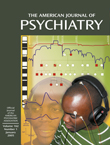Is Depression in Old Age Fatal Only When People Feel Lonely?
Abstract
OBJECTIVE: The impact of depression and perceived loneliness in the oldest old is largely unknown. The authors studied the relationship between the presence of depressive symptoms and all-cause mortality in old age, especially the potential distorting effect of perceived loneliness. METHOD: Within a prospective population-based study of 85-year-olds, the 15-item Geriatric Depression Scale and the Loneliness Scale were annually applied in all 476 participants with a Mini-Mental State Examination score of 18 points or more. RESULTS: Depression was present in 23% and associated with marital state, institutionalization, and perceived loneliness. When depression and perceived loneliness were assessed during follow-up, neither depression nor perceived loneliness had a significant effect on mortality. However, those who suffered from both depression and feelings of loneliness had a 2.1 times higher mortality risk. CONCLUSIONS: The data suggest that the increased mortality risk attributable to depression in the presence of perceived loneliness may result from motivational depletion.



